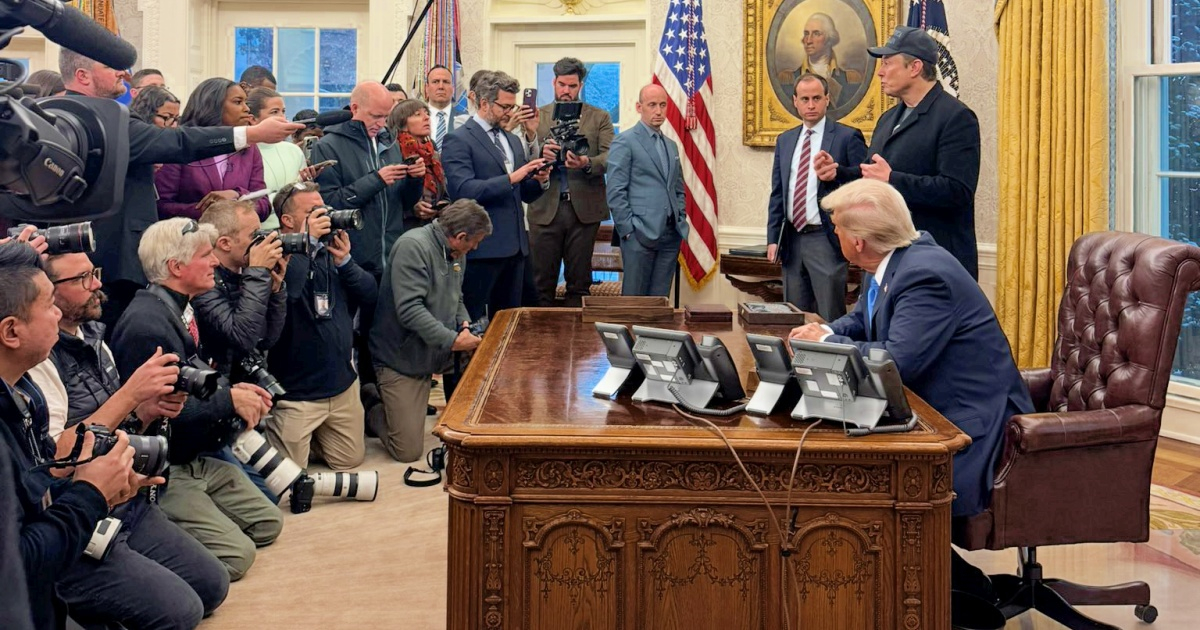On Tuesday, former President Donald Trump denied entry to a journalist from The Associated Press (AP) at an Oval Office event. This decision stemmed from AP's refusal to alter its editorial style regarding the name of the Gulf of Mexico, which Trump had sought to rename as the "Gulf of America." The exclusion also extended to another AP journalist at a subsequent event held in the White House's Diplomatic Room, sparking widespread criticism and concerns over press freedom in the United States.
Julie Pace, Senior Vice President and Executive Editor of AP, condemned the action as an assault on journalistic independence. "It's alarming that the Trump administration is punishing AP for its independent journalism," Pace stated in a release. "Restricting our access to the Oval Office based on AP's editorial content severely impedes public access to independent news and clearly violates the First Amendment of the U.S. Constitution."
The Trump administration did not provide any official comment on the measure, and there were no indications that other journalists faced similar restrictions. Nonetheless, Trump's relationship with the media has been contentious since his first term, and this move heightens concerns about censorship under his leadership.
Controversy Over Naming the Gulf
The Gulf of Mexico, a body of water shared by the United States and Mexico, has been known by that name for over 400 years. Trump's initiative to rename it as the "Gulf of America" was met with criticism and ridicule, particularly from Mexico's President Claudia Sheinbaum, who responded with sarcasm.
Three days after Trump's inauguration, AP made it clear that it would continue to use "Gulf of Mexico" while also reporting on the president's decision. "As a global news organization distributing information worldwide, AP must ensure place names and geography are easily recognizable to all audiences," the agency stated. AP's style is not only adhered to by the agency itself but also serves as a guide for thousands of journalists and writers globally.
Press Conditions Under Trump's Administration
Tim Richardson, Director of the Journalism Program at PEN America, described the White House's ban as "an affront to the First Amendment of the U.S. Constitution, which prohibits the government from impeding press freedom." The White House Correspondents' Association (WHCA) also issued a strong statement denouncing the action and urged the Trump administration to reverse it immediately.
"The White House cannot dictate how news organizations report the news, nor should it penalize working journalists because it is dissatisfied with their editors' decisions," expressed Eugene Daniels, WHCA President.
Impact on Other Platforms
The renaming controversy has also affected other platforms. This week, Google Maps adopted "Gulf of America," citing its "usual practice" of following U.S. government directives in such matters. Initially, Apple Maps retained "Gulf of Mexico" but later allowed both names to appear in specific searches.
This is not Trump's first attempt to alter geographic names. Previously, he reversed former President Barack Obama's decision to rename a mountain in Alaska as Denali, reinstating its name in honor of the 25th President, William McKinley.
Erosion of Government Transparency
Reporters Without Borders (RSF) warned in a recent report that the Trump administration has increased restrictions on access to government information. In just three weeks, the administration has removed official web pages, restricted previously accessible public data, and limited journalists' access to the White House and the Pentagon.
The organization urged the U.S. Congress to take urgent action to halt this trend. The Trump administration has also modified press accreditation rules, allowing podcasters and influencers to apply for credentials while limiting traditional media access. Additionally, the Pentagon announced a rotation of media in its offices, affecting organizations like NBC News, The New York Times, and National Public Radio.
Understanding the Press Freedom Challenge
Why did Trump ban the AP journalist from the Oval Office?
Trump barred the AP journalist due to the agency's refusal to change its editorial style regarding the name of the Gulf of Mexico, which Trump wanted to rename as the "Gulf of America."
What are the implications of this action on press freedom?
This action raises significant concerns about press freedom and the potential for government censorship, as it appears to punish media outlets for independent editorial decisions.
How did other organizations respond to the ban?
Various organizations, including PEN America and the White House Correspondents' Association, criticized the ban as an attack on the First Amendment and called on the Trump administration to reverse the decision.
